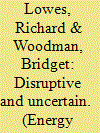| Srl | Item |
| 1 |
ID:
176831


|
|
|
|
|
| Summary/Abstract |
The decarbonisation of heating represents a transformative challenge for many countries. The UK's net-zero greenhouse gas emissions target requires the removal of fossil fuel combustion from heating in just three decades. A greater understanding of policy processes linked to system transformations is expected to be of value for understanding systemic change; how policy makers perceive policy issues can impact on policy change with knock-on effects for energy system change. This article builds on the literature considering policy maker perceptions and focuses on the issue of UK heat policy. Using qualitative analysis, we show that policy makers perceive heat decarbonisation as disruptive, technological pathways are seen as deeply uncertain and heat decarbonisation appears to offer policy makers little ‘up-side’. Perceptions are bounded by uncertainty, affected by concerns over negative impacts, influenced by external influences and relate to ideas of continuity. Further research and evidence on optimal heat decarbonisation and an adaptive approach to governance could support policy makers to deliver policy commensurate with heat decarbonisation. However even with reduced uncertainty and more flexible governance, the perceptions of disruption to consumers mean that transformative heat policy may remain unpopular for policy makers, potentially putting greenhouse mitigation targets at risk of being missed.
|
|
|
|
|
|
|
|
|
|
|
|
|
|
|
|
| 2 |
ID:
096079


|
|
|
|
|
| Publication |
2010.
|
| Summary/Abstract |
The UK Government has committed itself to reducing its carbon dioxide emissions. The challenge of successfully achieving a transition to a sustainable energy system, in the context of the UK's largely privately owned energy industry, rests on the ability of policy makers to encourage and enable the necessary changes or innovation at all levels of the energy system. This paper argues that the UK's current, dominant political paradigm or framework (the regulatory state paradigm (RSP)) and within it, the role of the economic regulator, Ofgem acts as a fundamental block to this challenge.
The current economic regulatory system is based on trust in the market, or on predicted (albeit theoretical) known outcomes. To expand our regulatory system to one which can deliver a sustainable energy system requires innovation in a certain direction (as opposed to any innovation). That is the antithesis of the current process of regulation. Trust is required that Ofgem, the economic regulator, will develop rules and incentives which deliver an agreed sustainable energy goal, which is 'trusted' to be the 'right' goal. This requires Ofgem moving away from ex-ante regulation to a type of regulation where all costs, benefits and outcomes cannot be known beforehand and where they cannot necessarily be quantifiable. This has, very provisionally, been called Public Value Regulation (PVR).
|
|
|
|
|
|
|
|
|
|
|
|
|
|
|
|